- Home
- Geraldine Brooks
The Secret Chord
The Secret Chord Read online
Also by Geraldine Brooks
FICTION
Caleb’s Crossing
People of the Book
March
Year of Wonders: A Novel of the Plague
NONFICTION
The Idea of Home: Boyer Lectures 2011
Foreign Correspondence: A Pen Pal’s Journey from Down Under to All Over
Nine Parts of Desire: The Hidden World of Islamic Women
VIKING
An imprint of Penguin Random House LLC
375 Hudson Street
New York, New York 10014
penguin.com
Copyright © 2015 by Geraldine Brooks
Penguin supports copyright. Copyright fuels creativity, encourages diverse voices, promotes free speech, and creates a vibrant culture. Thank you for buying an authorized edition of this book and for complying with copyright laws by not reproducing, scanning, or distributing any part of it in any form without permission. You are supporting writers and allowing Penguin to continue to publish books for every reader.
ISBN 978-0-698-41148-7
Endpaper map by Laura Hartman Maestro
Version_1
Contents
Also by Geraldine Brooks
Title Page
Copyright
Dedication
Map
Epigraph
A Note on Names
The Names
The Secret Chord I
II
III
IV
V
VI
VII
VIII
IX
X
XI
XII
XIII
XIV
XV
XVI
XVII
XVIII
XIX
XX
XXI
XXII
XXIII
XXIV
XXV
XXVI
XXVII
XXVIII
Afterword
To Nathaniel . . .
“. . . the isle is full of noises,
Sounds and sweet airs that give delight and hurt not.”
“Now the acts of David the king, first and last, behold, they are written in the words of Samuel the seer, and in the words of Nathan the prophet . . .”
1 Chronicles 29
“Now the rest of the acts of Solomon, first and last, are they not written in the history of Nathan the prophet . . .”
2 Chronicles 9:29
A Note on Names
Throughout the novel I have used personal and place-names in their transliteration from the Hebrew of the Tanakh: Shaul, Shmuel and Shlomo, for example, rather than the perhaps more familiar Saul, Samuel and Solomon.
The Names
Nizevet, David’s mother according to the Talmud
Yishai (Jesse), David’s father
David’s Brothers and Sisters
Eliav
Avinadav
Shammah
Raddai
Natanel
Zeruiah
Avigal
David’s Wives
Mikhal, daughter of King Shaul, first wife of David
Ahinoam, second wife of David
Avigail of Carmel (Abigail), third wife of David
Maacah of Geshur
Hagit
Eglah
Avital
Batsheva
David’s Nephews
Yoav (Joab), David’s general, son of Zeruiah
Avishai, Yoav’s warrior brother
Asahel, Yoav’s warrior brother
Amasa, son of Avigal
Yonadav, son of Shammah
David’s Children
Amnon, son of Ahinoam
Daniel, son of Avigail
Avshalom, son of Maacah
Tamar, daughter of Maacah
Adoniyah, son of Hagit
Yitraam, son of Eglah
Shefatiah, son of Avital
Shlomo, son of Batsheva
Natan, son of Batsheva
Others
Shmuel (Samuel)
Avner (Abner), Shaul’s general
Moshe (Moses)
Yehoshua (Joshua)
Avram (Abraham)
There was an almond blossom, yesterday. It had opened its pale petals on a twig of the bough that curls and twists up to my windowsill. This morning, the blossom is gone; the paleness upon the twig is snow. It does one no good, in these hills, to set store by the earth’s steady warming.
My body is as bent as that bough. The cold is an ache in my bones. I am sure that this year’s reaping will be the last that I see. I hope only for one more season of summer fruit, for the ease of the hot sun on my back, for ripe figs, warm from the tree, spilling their sweet nectar through these splayed fingers. I have come to love this plain house, here among the groves. I have laid my head down in many places—on greasy sheepskins at the edge of battlefields, under the black expanse of goat hair tents, on the cold stone of caves and on the scented linens of palaces. But this is the only home that has been my own.
They are at work, already, on Har Moriah. From across the wadi, I can hear the thin squeal of the planes scraping upon the logs. Hard work to get these trees here; felled in the forests of the Lebanon, lashed together into rafts, floated south on the sea, dragged up from the coast by oxen. Now the tang of cut cedar perfumes the air. Soon, the king will come, as he does every morning, to inspect the progress of the work. I know when he arrives by the cheers of the men. Even conscripted workers and slaves call out in praise of him, because he treats them fairly and honors their skill.
I close my eyes, and imagine how it will be, when the walls have risen from the foundations of dressed stone: the vast pillars carved with lilies and pomegranates, sunlight glinting on cladding of gold . . .
It is the only way I will ever see it: these pictures in my mind’s eye. I will not live to make the ascent up the broad stairs, to stand within the gilded precincts as the scent of burning fat and incense rises to the sky. It is well. I would not wish to go without him. I thought, at one time, that we would go together. I can still see his eyes, bright with the joy of creation, as he chose and planned what materials, what embellishments, pacing the floor, throwing his arms up and shaping the pillars as he envisioned them, his long fingers carving the air. But that was before I had to tell him that he would never build the temple. Before I had to tell him that all his killing—the very blood that, one might say, slakes the mortar of those foundation stones—had stained him too deeply. Strange words, you might think, to come from the selfsame source that had required these killings of him.
Hard words, like blows. The blast from heaven, issuing from my mouth. Words born of thoughts I had not had, delivered with anger I did not feel, spilling out in a voice I did not even know for my own. Words whose reason no human heart could fathom. Civilization is built upon the backs of men like him, whose blood and sweat make it possible. But comes the peace, and the civil world has scant place for such men. It fell to me to tell him so.
And like all such words that have formed upon my lips, these have become true in fact. It has come to be just as the voice said it would: this one dear ambition denied him. A bequest, instead, to his heir.
In this, I am more fortunate than he. I have lived to complete my life’s great work. I have roll
ed and tied the scrolls with my own hands, sealed them with wax, secured them in clay vessels, and seen to their placement in the high, dry caves where I played as a child. In the nights, which have become so long for me, I think of those scrolls, and I feel a measure of peace. I remember it all so clearly, that day, at the turn of the year, the month when kings go out to battle. How warily I broached the matter. It might seem odd to say so, as my whole life in his service had been bent to this purpose: the speaking of truth, welcome or no. But it is one thing to transmit the divine through a blasting storm of holy noise, another thing entirely to write a history forged from human voices, imperfect memories, self-interested accounts.
I have set it all down, first and last, the light and the dark. Because of my work, he will live. And not just as a legend lives, a safe tale for the fireside, fit for the ears of the young. Nothing about him ever was safe. Because of me, he will live in death as he did in life: a man who dwelt in the searing glance of the divine, but who sweated and stank, rutted without restraint, butchered the innocent, betrayed those most loyal to him. Who loved hugely, and was kind; who listened to brutal truth and honored the truth teller; who flayed himself for his wrongdoing; who built a nation, made music that pleased heaven and left poems in our mouths that will be spoken by people yet unborn.
I have had a great length of days, and been many things. A reluctant warrior. A servant, a counselor. Sometimes, perhaps, his friend. And this, also, have I been: a hollow reed through which the breath of truth sounded its discordant notes.
Words. Words upon the wind. What will endure, perhaps, is what I have written. If so, it is enough.
I
A man alone in a room. Not such an extraordinary thing. Yet as I stepped into the chamber I had a sense of something out of place. My eye traveled around the space, the woven pillows, the low tables set with sweating ewers of cool water . . . all was in order, yet something was not right. Then I grasped it. It had been a while since I had found him in a room by himself. For a long time, it seemed, he had moved in a press of people: members of his household, the men of his army, his sons, servants, sycophants.
He stood by the open window, his back to me. From my place by the door I could not see what he saw, but the sounds made plain enough what held his gaze: the snap of banners in the breeze, the stamp of hooves, the wince and grind of iron on stone. And woven among these, like a bright thread through homespun, the sudden excited shouts of little boys. For them, born in the years of victory, muster for war was cause for uncomplicated joy. I knew that giddy thrill. I had been such a boy myself, once. When he, little more than a youth, led the band that sacked my village.
His fists, balled tight, were planted on the wide sill of the window embrasure, his arms encircled by polished copper cuffs. His hair, the same color as the copper, was undressed, and fell in a dense mane against the fine black wool of his mantle. The cuffs glinted in the low slant of early light as his arm muscles flexed. He was clenched from head to foot.
I am not a coward. Being in his service does not allow for it. My life, at certain times, has required me to draw upon deep wells of courage, and I am glad to say that I have never yet come up dry. But as I have resolved to set down a full account here, so I must begin with an honest accounting of myself. That morning, I was afraid. I had been summoned from my bed when it was still full dark, and though my slave, when he called me, had thought to bring a tray of warm bread fresh from the ovens, I had not touched it. Now, my empty stomach churned. Sound carries, at that hour, and as I waited in the anteroom, even the heavy cedar door could not muffle the angry voices within.
When Yoav exited the room, he burst through the door so abruptly that the young guard barely had time to come to attention, the butt of his spear striking the stone floor a few seconds after his general had already swept past him. Yoav’s lips were drawn thin as a sheet of linen, his skin as pallid. He paused for a moment, fiddling with a strap on his greaves. His hand, which I saw was trembling slightly, could not manage the buckle. I have known Yoav since I was a child and he a youth thinking to kill me. I have seen him outnumbered on the battlefield and watched him run a man through at close quarters. I have seen him stand accused of murder, awaiting a death sentence. But never before had I seen his hand shake. He saw that I noticed, and he scowled. “Go in,” he said tersely. “He wants you.” Then, as I edged past him: “Take care. He is in a rage. His mood is foul.”
The guard opened the door for me, looking to neither right nor left as I passed from the anteroom to the inner chamber. I stood, just inside, waiting for acknowledgment. After a time, unsure if he knew that I was there, I cleared my throat. Still he did not turn. I held myself motionless, my gaze on the yellow shaft of sunlight widening upon the flagstones. Although it was early, the room was warming. Soon enough, it would be hot. I felt a bead of sweat forming on my brow.
Suddenly, he opened his fists, reached for the shutters, and slammed them shut. He turned, his light mantle swinging. I, who had served him for years, was used to that face, its grave beauty, the bright glance that could kindle love or fear. But the expression was not the one I had expected. Yoav was son of the king’s older sister; they had become men together. He knew David as well as anyone alive. Yoav had said anger, and anger was there, but I could tell he had not read his uncle in full. Anger was there, but not anger only. The tense set of David’s body showed will at work, containing wrath, but also grief. The glint in his eye was, I believe, a tear.
“What is the profit of being an anointed king, Natan, if I am to be confined here like a prisoner?”
“Your generals act only out of love for you—”
His hand spliced the air. “They act out of fear.” He had never been a man for platitude. “Love?” He spat the word. “There is no love in this. This is fear and mistrust. And for what? The lapse of a moment, merely. How many wars have we made together? You have been at my side, time and again, when we fought the Plishtim. You were with me in the south when we crushed the Moavites, and in the north against the Arameans. And you know well—who better?—I was a warrior for years before that. In all those battles, when did I ever flinch? Tell me. Tell me a time I faltered.” The voice had steadied now, and was rising.
That voice. So familiar to me. So familiar to all of us. The sweet singer of Israel. So the people called him, long before he was king. I had heard that singer’s voice fill a hall, and bring tears to the cheeks of seasoned warriors. But I had heard it also on the battlefield, fierce and wild, carrying over the clash of arms and the cries of the dying.
“Never,” I answered him. This was not flattery, but unburnished truth. In my mind, the visions crowded, one layered upon the other, each of them with the unnatural vividness of memories forged at moments when one’s life is at risk. I could see bright hair flying from beneath the iron helmet as he sprinted before us into a clatter of arrows, the faceted muscles of his calves as he led the swarm up a siege ladder, the sinews of his back, taut with the strain of the pulled bow as he braced himself in the merkava. Every memory I had of him was a view from behind. Simply because, at the deadly moment, he was always in the forefront.
I had been trailing after him, as ever, at the end of that most recent campaign, of which he now spoke. We had been fighting for more than a week, the advantage now theirs, now ours. The day was hot, windless. The air was thick with lingering smoke from the night’s death pyres, still smoldering. The stench of charred bone met the stink of rot and vomit, shit and sweat. I have never loved war, as some men love it. I have fought of necessity, as has every man my age with two legs, two arms and wit enough to follow a simple order. It is what the times, and the Land, have required of us.
It was nearing sunset on the eighth day. We’d fought since dawn. I had reached that point beyond exhaustion, where every muscle quivers and my mind could not hold a thought beyond the next step, and the one after, the next breath, and the one after. We went forward throug
h sheer will—his will, that force that could goad a man to do what was beyond him. Finally, in the long shadows of the late afternoon, the Plishtim began to fall back from the plain. Their retreat was toward the foothills. Another general would have let them go and been glad of it. But he saw that if they secured that high ground they might regroup and come at us again, this time with their archers positioned to advantage. So he called us to ranks with a curdling cry. I glimpsed his face through the crowd of men. It was bloodied, dirt-streaked, avid. Then he turned, fist to the sky, and sprinted. He set the pace for the fleetest of his runners, youths who could give him a decade. Even uphill, he seemed to fly over the loose stones that slid out from underfoot and left me skidding and swearing.
I fell behind, and lost sight of him. Others—younger men, better fighters—overtook me, swarming to him, compelled by his courage. When I finally glimpsed him again, he was above me on a long, slender ridge, in the thick of fierce fighting. Trying to narrow the distance between us, I lost my footing entirely on the uncertain ground. I slipped. Metal, leather and flesh scraped against rough limestone that bit like snaggleteeth. I could not control my fall until I planted my foot into something that gave softly under my weight. The man had been attempting to crawl away, dragging himself with his remaining hand while a slime of blood pulsed from the stump of his sword arm. My boot, mashing his neck flat into stone, had put an end to that. When I lifted my foot, the man gave a wet gargle, and was still. I scraped the mess off my boot onto the nearest rock and went on.
When I reached the ridge, the king was making an end of another fighter. He was up close, eye to eye. His sword had entered just above the man’s groin. He drew it upward, in a long, slow, arcing slash. As he pulled the blade back—slick, dripping—long tubes of bowel came tumbling after. I could see the dying man’s eyes, wide with horror, his hands gripping for his guts, trying to push them back into the gaping hole in his belly. The king’s own eyes were blank—all the warmth swallowed by the black stain of widening pupils. David reached out an arm and pushed the man hard in the chest. He fell backward off the narrow ledge and rolled down the slope, his entrails unfurling after him like a glossy ribband.

 Year of Wonders
Year of Wonders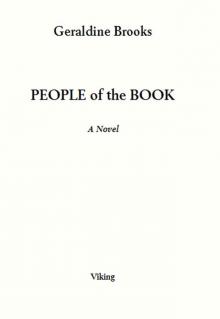 People of the Book
People of the Book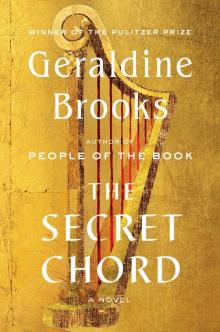 The Secret Chord
The Secret Chord Foreign Correspondence
Foreign Correspondence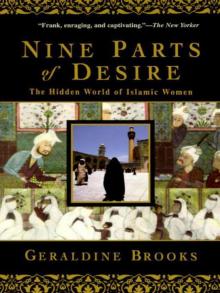 Nine Parts of Desire (Korean Edition)
Nine Parts of Desire (Korean Edition)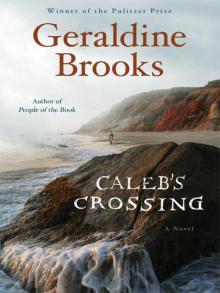 Caleb's Crossing
Caleb's Crossing The Idea of Home
The Idea of Home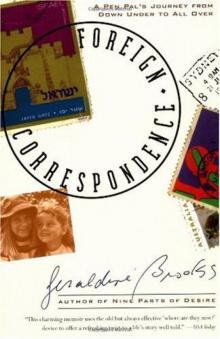 Foreign Correspondence: A Pen Pal's Journey
Foreign Correspondence: A Pen Pal's Journey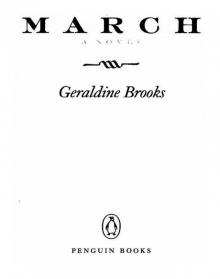 March
March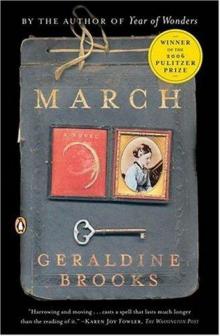 March: a novel
March: a novel The Best American Short Stories® 2011
The Best American Short Stories® 2011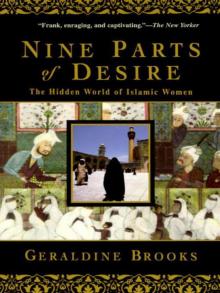 Nine Parts of Desire
Nine Parts of Desire